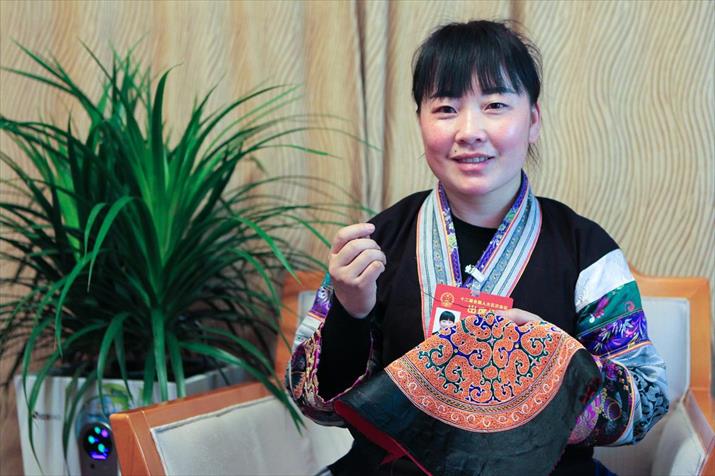|
||||||||||
| Home Nation World Business Opinion Lifestyle ChinAfrica Multimedia Columnists Documents Special Reports |
|
||||||||||
| Home Nation World Business Opinion Lifestyle ChinAfrica Multimedia Columnists Documents Special Reports |
| The CPC Leading to Prosperity |
| Opportunity Strikes |
| A CPC member helps her fellow villagers out of poverty with her embroidery skills |
| By Cui Xiaoqin and Ma Li ·2017-07-11 |

Born in a small village in Zhijin County, Bijie City in southwest China's Guizhou Province, Cai Qun and her sister grew up impoverished, surviving by menial labor. They moved to cities in Zhejiang and Guangdong provinces and worked there for a few years, before Cai returned to her hometown. Having found her vocation, Cai led villagers to wealth by promoting traditional local embroidery and batiks. For her contribution to social welfare she was elected deputy to the NPC in 2013.
Cai's childhood memories are all filled with poverty. "My family was too poor to support my sister and me to go to school. We have to make a living by collecting scraps for recycling in cities near our village," recalled Cai of Miao ethnic minority. But this time poverty served to make her determined to make something of her life.
After returning from difficult years in Zhejiang and Guangdong with her husband to her hometown in 2006, her fortunes began to change. "I was good at embroidery when I was young, and an official in my village encouraged me to take part in a competition to promote Guizhou craft items." Her entry won a 2,000 yuan ($290) prize. In the next following years she won many other awards for her embroidery and earned the title of "skilled craftswoman." Along with the awards, Cai found ample business opportunities to use her traditional embroidery techniques.
In 2009, with 50,000 yuan ($7,200) of borrowed funding, Cai and her husband established a company with one sewing machine and two embroiders to make batik and embroidery products. "The beginning was quite difficult," Cai said.
Cai's batik and embroidery company mainly produces tourist souvenirs of Miao batik embroidery. The products were sold in Zhijin Cave Scenic Area near her village, and became popular with tourists.
In order to open up a larger domestic market, Cai participated in trade fairs held in Shanghai and Guangdong. After many rejections from buyers, a factory owner gave her an order for 100,000 yuan ($14,500). It was a turning point for her and she recognized that this ancient embroidery technique could generate an income.
Cai believes that because the value of ethnic minority artworks is now being acknowledged, these groups should preserve their traditions and pass them on.
"By combining ethnic artworks with tourism, we can protect our traditions and create value," she said.
As most girls in the village have learnt batik and embroidery skills from their mothers since childhood, Cai said if these skills are combined with modern aesthetics and market requirements, they could be a viable opportunity for local residents.
"Local government set the batik and embroidery industry as a targeted alleviation measure to help people out of poverty. In the past two years, my business has grown, providing a brighter future for women like me," said Cai.
Her company now hires more than 300 local women. The products have been exported to the United States, South Korea and Malaysia and the business is attracting an increasing number of migrant women who can earn more than 3,000 yuan ($434) per month.
"[With this money], they can take better care of their children and parents in village," said Cai, who became a CPC member in September 2015.
"Many people say they elected me to represent them in NPC sessions because they think I can lead them out of poverty and share my experience nationwide," said Cai. "I do not want to let them down." The mountainous Guizhou Province has the largest poverty-stricken population (4.93 million) in China.
In March this year, Cai submitted a proposal at the NPC session on supporting small enterprises and helping left-behind children (children whose parents have gone to cities in search of work) in mountain villages. "I am sure the government will give more support in this area," she said.
| About Us | Contact Us | Advertise with Us | Subscribe |
| Copyright Beijing Review All rights reserved 京ICP备08005356号-5 京公网安备110102005860号 |